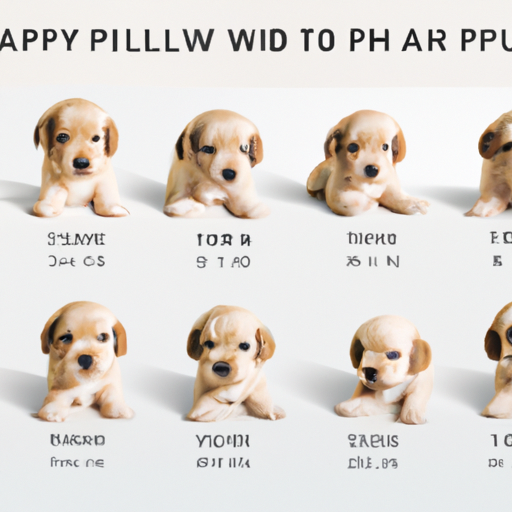Introduction
You just brought home a cuddly, warm ball of fur, and now you’re wondering what comes next. Understanding the stages of puppy development will help you navigate this exciting journey. It’s an adventure filled with growth, learning, exploration, and lots of puppy kisses.
Stage One: Neonatal Period (0-2 weeks)
As a caregiver, you’ll find that your puppy is born into the world with limited senses during the neonatal period. This stage lasts from birth until about two weeks of age.
- Senses: Your puppy is practically blind and deaf. They rely on touch and smell to navigate their world, staying close to their mother and siblings for warmth and nourishment.
- Development: Your puppy spends most of its time sleeping or feeding. This is a critical period for their growth.
Care Tips:
– Provide a warm, safe environment.
– If the puppy is orphaned, they will need bottle feeding with a puppy milk replacement formula.
Stage Two: Transitional Period (2-4 weeks)
In this stage, your puppy undergoes rapid physical and sensory development.
- Senses: Your puppy’s eyes and ears begin to open, and they start responding to light, movement, and sounds.
- Development: They begin to walk, wag their tail, and even start to grow baby teeth.
Care Tips:
– This is a good time to introduce toys and different textures to stimulate their senses.
– Keep their living area clean as they start to explore.
Stage Three: Socialization Period (4-12 weeks)
This is one of the most critical stages of puppy development, during which they learn about their environment and social interactions.
- Senses: They become fully aware of their surroundings, with fully developed sight and hearing.
- Development: They start to interact more with their siblings and other animals. This is also when they start learning the consequences of their behavior.
Care Tips:
– Socialize your puppy with other dogs and humans to encourage good behavior.
– Begin basic training commands.
Stage Four: Ranking Period (3-6 months)
Your puppy starts to understand their place in the pack hierarchy.
- Senses: They become more alert and responsive.
- Development: They begin teething, and their energy levels increase.
Care Tips:
– Continue with obedience training.
– Provide teething toys.
Stage Five: Adolescence (6-18 months)
As your puppy matures, they enter the adolescent stage.
- Senses: Their senses are fully developed.
- Development: They reach sexual maturity and may begin to show signs of independence or test boundaries.
Care Tips:
– Maintain a consistent training routine.
– Spay/neuter your puppy, if not done already.
Stage Six: Adulthood (1-3 years)
Your puppy is now an adult dog. Their physical growth slows down, and they start to settle into their temperament and behavior.
Care Tips:
– Keep up with regular vet checkups.
– Continue with physical and mental stimulation.
Stage Seven: Senior (7+ years)
Your dog enters their twilight years, and while they may slow down, they still need plenty of love and care.
Care Tips:
– Regular vet checkups are crucial at this stage.
– Provide a balanced diet and regular, gentle exercise.
FAQs
Q: When can I start training my puppy?
A: Basic training commands can be started during the socialization period (4-12 weeks).
Q: How often should I feed my puppy?
A: Puppies should be fed 3-4 times a day until they are 6 months old, then reduce to 2-3 times a day.
Q: When should I take my puppy for their first vet visit?
A: Ideally, within the first week of bringing them home. Your vet will set a vaccination schedule and discuss care and nutrition.
Q: When is it safe to socialize my puppy with other dogs?
A: After they’ve had their first set of vaccinations, usually around 8-9 weeks.
Remember that every puppy develops at their own pace, so these stages are just a guideline. Enjoy every moment of this journey, as your little pup grows into a loyal, loving dog.



